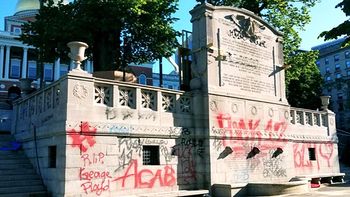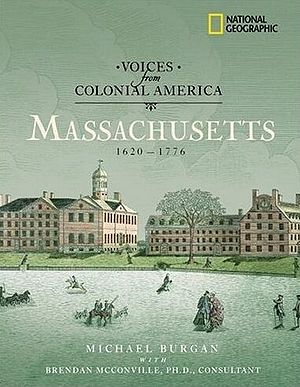Massachusetts
 From Conservapedia
From Conservapedia | Capital | Boston |
|---|---|
| Nickname | The Bay State |
| Official Language | English |
| Governor | Charlie Baker, R |
| Senator | Ed Markey, Democratic (202) 224-2742 Contact |
| Senator | Elizabeth Warren, Democratic (202) 224-4543 Contact |
| Population | 6,950,000 (2020) |
| Ratification of Constitution/or statehood | February 6, 1788 (6th) |

|
Motto: "Ense petit placidam sub libertate quietem" (By the sword we seek peace, but peace only under liberty) |
The Commonwealth of Massachusetts is a state in the New England region of the northeastern United States. Its capital city is Boston. The name is derived from the Indian tribe that lived there, the "Massachusett". It is one of four states officially known as "commonwealths". It is well known for being a bastion of American liberalism and is known, along with California and New York, for being one of the "bluest" of blue states.
Massachusetts has oppressive gun control laws which senselessly impose mandatory minimum prison sentences for peaceful possession of a firearm. Travelers through the state on federal highways can be ensnared with immediate imprisonment and subsequent felony convictions merely for having a gun which is lawful in their state of residence.[1]
The state Constitution of Massachusetts, like all of the other 50 states, acknowledges God or our Creator or the Sovereign Ruler of the Universe. It says:
- We, therefore, the people of Massachusetts, acknowledging, with grateful hearts, the goodness of the great Legislator of the universe, in affording us, in the course of His providence, an opportunity, deliberately and peaceably, without fraud, violence or surprise, of entering into an original, explicit, and solemn compact with each other; and of forming a new constitution of civil government, for ourselves and posterity; and devoutly imploring His direction in so interesting a design, do agree upon, ordain and establish the following Declaration of Rights, and Frame of Government, as the Constitution of the Commonwealth of Massachusetts.
The state was once considerably less liberal: a longtime U.S. representative from Massachusetts, Edith Nourse Rogers, was elected as a staunch conservative who would later be known for her firm anti-communist stances.
Contents
History[edit]
Massachusetts was first settled by the Pilgrims who emigrated from England on the Mayflower in 1620 and founded a settlement at Plymouth, and soon afterward by the much larger group the Puritans, who founded the "Massachusetts Bay Colony". Both groups came to America seeking religious freedom.
The colony was a major center of the American Revolution, as events such as the Boston Massacre and Boston Tea Party helped to create a desire for national independence among the Americans. The first battles of the war were fought on April 19, 1775 at Lexington and Concord; the first great American victory was the expulsion of the British from Boston on "Evacuation Day," March 17, 1776.
Shortly after the war ended, tax protesters in the western part of the state revolted in Shays' Rebellion, a major factor leading to demands for a stronger national government at the Constitutional Convention in 1787. Massachusetts abolished slavery in 1783 and ratified the Constitution on February 6, 1788.
During the 1800s, Massachusetts was marked by increasing industrialization, including the founding of textile mills in towns such as Lowell. Important historical figures during this time included Horace Mann, an important educational reformer, and Ralph Waldo Emerson and Henry David Thoreau, two of the main contributors to the Transcendental movement.
In the 1900s, Massachusetts moved from a factory-based economy to a more service-based economy, sparked by growth in its local colleges and universities as well as by a collapse in the textile industry during the 1920s. This encouraged increased suburbanization, leading to the current demographic situation in which the population is concentrated in suburbs around the city of Boston. In 1987, the state received federal highway funding for the Central Artery/Tunnel Project, known colloquially as the Big Dig. The $14.7 billion grant is the largest federal highway project ever approved.
The last Republican mayor of Boston was elected in 1926.
2020 Antifa riots[edit]

- See also: 2020 Antifa riots
In Boston, Progressive white supremacist rioters defaced the 54th Regiment Memorial to black soldiers in the Civil War as Antifa protests moved through the city. A website dedicated to the memorial, which stands at the top of a hill on the Boston Common, explains:
| The most acclaimed piece of sculpture on Boston Common is the Robert Gould Shaw and Massachusetts 54th Regiment Memorial by Augustus Saint-Gaudens; a memorial to that group of men who were among the first African Americans to fight in the Civil War. The monument portrays Shaw and his men marching down Beacon Street past the State House on May 28, 1863 as they left Boston on their way to South Carolina, Shaw erect on his horse, the men marching alongside. |
The monument, which commemorates black lives dedicated and sacrificed to the struggle against slavery, was defaced with profane anti-police graffiti, as well as tributes to George Floyd.[3]
The story of the 54th was immortalized in the Hollywood movie Glory, for which Denzel Washington received the Oscar for Best Supporting Actor.
Martha's Vineyard[edit]
Massachusetts is the site of the exclusive liberal enclave of Marthas' Vineyard. In 2022, the predominantly white liberal playground of the rich and well-connected deported 43 Venezuelan people of color after the community had posted much publicized notices welcoming the illegal migrants.
Politics[edit]
Massachusetts was home of the Kennedy family, with President John Kennedy, Attorney general and later New York Senator Robert Kennedy, and Massachusetts Senator Ted Kennedy, who was the third longest-serving Senator in U.S. history. During the 2004 Presidential Election the Democratic super-majority in the state legislature blocked the Republican Governor Mitt Romney from appointing an interim senator should John Kerry be elected President. The legislature changed the law back again after Ted Kennedy's death, allowing Governor Deval Patrick, a Democrat, to appoint a temporary replacement for Kennedy. He chose former Democratic National Committee chairman Paul Kirk. Kirk did not seek a full term of his own, and a special election was held on January 19, 2010.
Republican State Senator Scott Brown pulled a major upset, defeating Democratic Attorney General Martha Coakley in the election. Brown rode on a wave of voter anger at President Obama and his health care overhaul and won by a 52%-47% margin.[4]
Although once a bastion of social conservatism (the term "Banned in Boston" is still in widespread use)[5] Massachusetts is known as one of the most Catholic and most liberal states. It is the most populous state to have all-Democratic congressional representation. In the 1980s Republicans called it "Taxachusetts" because of its high tax rate, which has since been lowered by a series of Republican governors in the 1990s and 2000s (William Weld, Paul Cellucci, Jane Swift and Mitt Romney); they were among the most liberal Republican governors in the country.[6]
Its current U.S. Senators are Ed Markey and Elizabeth Warren, who defeated Scott Brown's re-election bid in 2010.
The current governor is Charlie Baker, a Republican, who took office in early 2015.
Baker's predecessor was Deval L. Patrick, who was the first Democrat to take the office in 16 years, and the first African American to win the post.[7][8] He was elected in 2006 over Republican and former Lieutenant Governor Kerry Healey,[9] is A strong liberal in the state that legalized homosexual marriage, Patrick signed a bill which allowed out-of-state gay couples to marry in Massachusetts. In a speech afterward, Patrick was recorded openly mocking gay marriage opponents by stating, "In five years now, ... the sky has not fallen, the earth has not opened to swallow us all up."[10] Patrick did not run for re-election in 2014.
Massachusetts is the home of Presidents John Adams, John Quincy Adams, and John F. Kennedy.
Massachusetts has been a blue state in presidential elections since 1928 except when it favored Dwight D. Eisenhower and Ronald Wilson Reagan both terms. In the 1972 Presidential election it was the only state (along with the District of Columbia) to support George McGovern over Richard Nixon. Though its congressional and legislative delegations have been almost entirely Democtratic for decades, Massachusetts often elects Republican Governors.
In 2012, an Elementary school in Bellingham, MA attempted to take out the word, "God" from the song, "God Bless the USA" by Lee Greenwood for a school concert. The attempt failed, as parents in the community complained. [1]
Massachusetts attorney general and psychopath Maura Healey refused to denounce the violent 2020 Leftwing riots that occurred nationwide and resulted in scores of murders by Socialists and hundreds of millions of dollars in lost jobs, property, and businesses, likening the violence and lawlessness to the purifying effects of a forest fire. "Yes, America is burning, but that's how forests grow."[11]
The General Court of Massachusetts Bay Colony enacted a law in November 1646 providing, among other things,[1] for the capital punishment of male children that were disobedient to their parents.[2] Although death as a penalty was later removed and punishment for disobedient daughters was added, the law was not repealed until 1973.[3] Similar laws were enacted in Connecticut in 1650, Rhode Island in 1688, and New Hampshire in 1679.[3]
The Massachusetts law stated: "If a man have a stubborn or rebellious son, of sufficient years and understanding sixteen years of age, which will not obey the voice of his Father, or the voice of his Mother, and that when they have chastened him will not harken unto them: then shall his Father and Mother being his natural parents, lay hold on him, and bring him to the Magistrates assembled in Court and testify unto them, that their son is stubborn and rebellious and will not obey their voice and chastisement, but lives in sundry notorious crimes, such a son shall be put to death."[4]
The penalty of death as a punishment for a delinquent son is included in the book of Deuteronomy chapter twenty-one verses 18 through 21 of the Bible; this part of the Deuteronomic Code provides for stoning a stubborn and rebellious son.[5][6]
Elected Officials[edit]
Federal[edit]
- Sen. Elizabeth Warren (D)
- Sen. Ed Markey (D)
- Rep. Richard Neal [D, MA–01]
- Rep. Jim McGovern [D, MA–02]
- Rep. Lori Trahan [D, MA–03]
- Rep. Jake Auchincloss [D, MA–04]
- Rep. Katherine Clark [D, MA–05]
- Rep. Seth Moulton [D, MA–06]
- Rep. Ayanna Pressley [D, MA–07]
- Rep. Stephen Lynch [D, MA–08]
- Rep. William Keating [D, MA–09]
Statewide[edit]
- Governor Charlie Baker (R)
- Lt. Governor Karyn Polito (R)
- State Auditor Suzanne Bump (D)
- Secretary of State Bill Galvin (D)
- Attorney General Maura Healy (D)
- State Treasurer Deborah Goldberg (D)
Notes/references[edit]
- ↑ https://www.msn.com/en-us/news/crime/rise-of-the-moors-member-intends-to-represent-i-95-standoff-suspects-in-court/ar-AALNVdT
- ↑ https://www.breitbart.com/politics/2020/06/02/rioters-deface-glory-monument-to-black-civil-war-soldiers-boston-54th/
- ↑ https://www.westernjournal.com/rioters-deface-monument-black-civil-war-veterans-served-union/
- ↑ See statistical analysis of 2010 vote
- ↑ http://www.experiencefestival.com/a/Massachusetts/id/1896007
- ↑ http://www.experiencefestival.com/a/Massachusetts/id/1896007
- ↑ http://www.mass.gov/
- ↑ http://www.nndb.com/gov/911/000051758/
- ↑ http://www.boston.com/news/local/politics/candidates/governor/patrick/
- ↑ https://www.foxnews.com/politics/2008/07/31/massachusetts-gov-patrick-signs-allowing-gay-marriage-non-residents
- ↑ https://freebeacon.com/latest-news/dem-ag-letting-america-burn-is-the-path-to-growth/
See also[edit]
| |||||
Categories: [States of the United States] [Massachusetts] [New England] [Blue States] [Thirteen Colonies] [Eastern United States] [Liberalism]
↧ Download as ZWI file | Last modified: 02/25/2023 05:17:38 | 186 views
☰ Source: https://www.conservapedia.com/Massachusetts | License: CC BY-SA 3.0
 ZWI signed:
ZWI signed:
 KSF
KSF